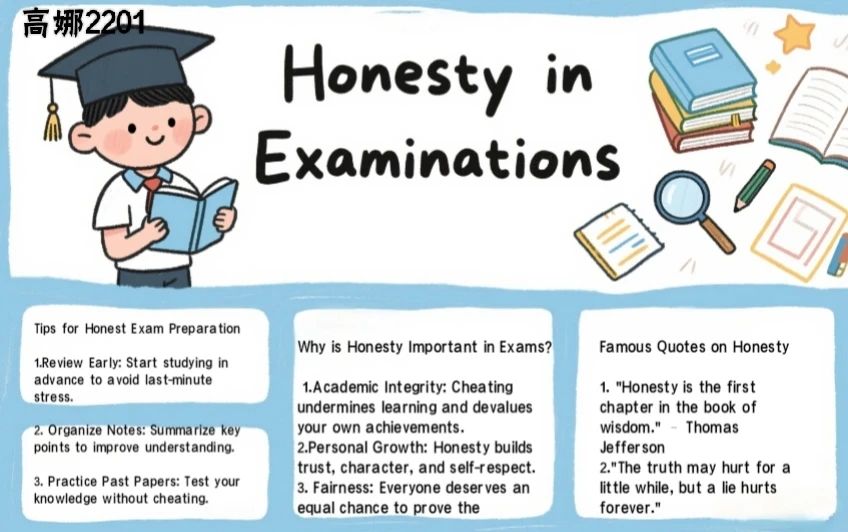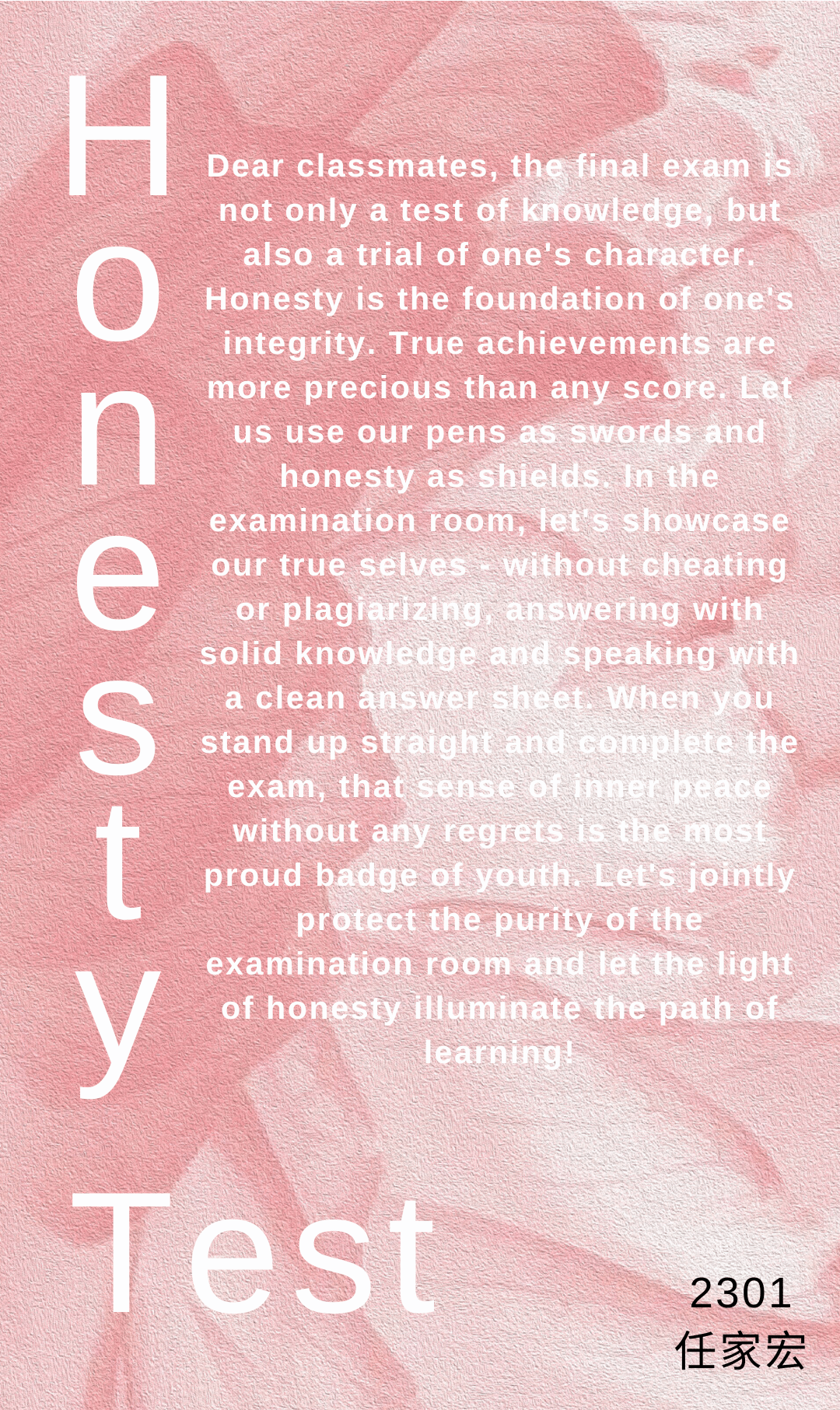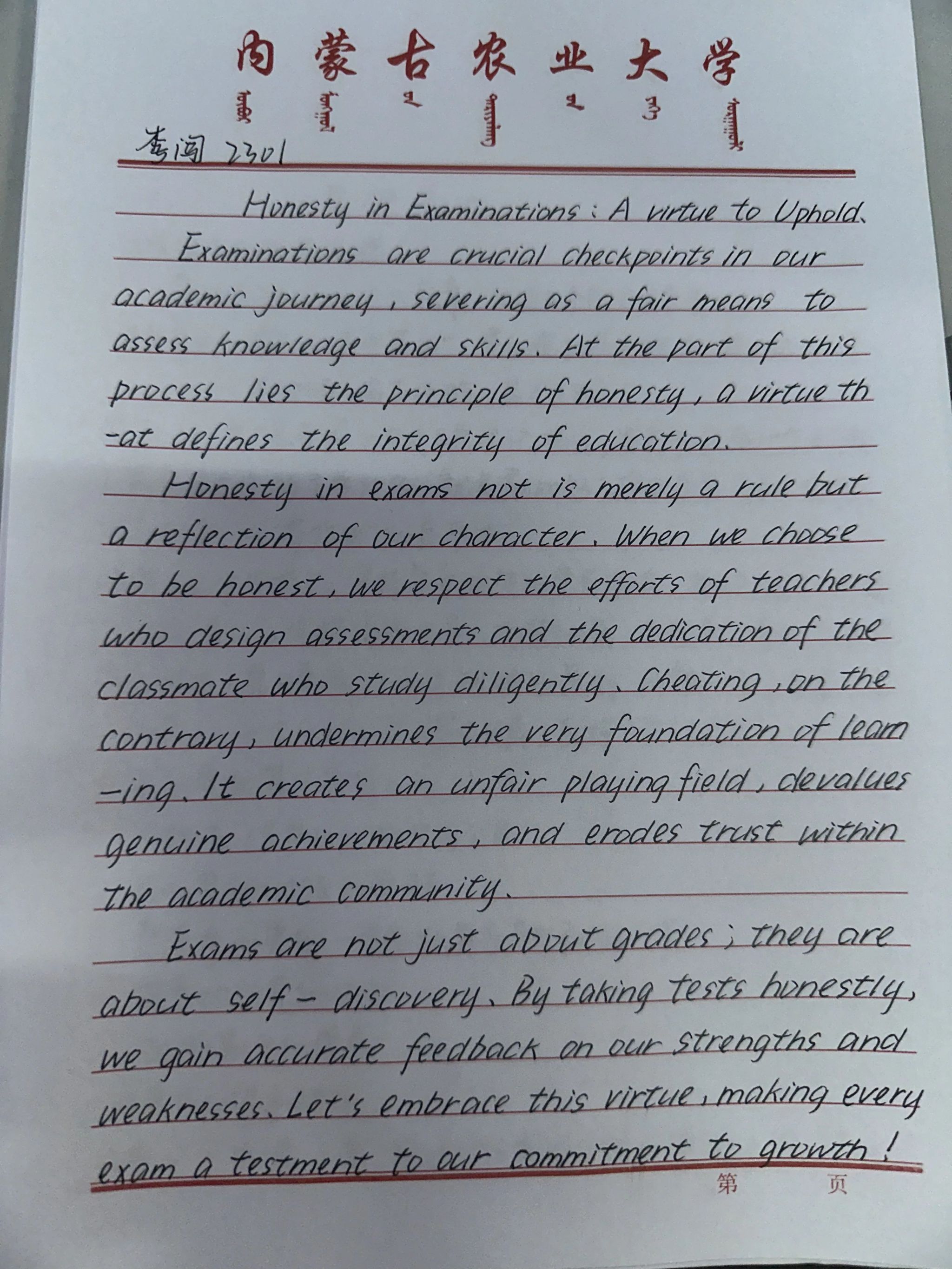2201 苗雨薇
考试,不仅是对知识的检验,更是对品格的试金石。诚信考试,是每位学子应坚守的底线,它关乎个人的尊严,也维系着教育的公平与纯粹。
诚信考试是对自我的尊重。考试成绩是学习成果的量化体现,唯有凭借真实水平获得的分数,才能如实反映知识的掌握程度,帮助我们查漏补缺。若通过作弊获取“高分”,看似骗过了老师和家长,实则是欺骗自己,错失了进步的机会,最终损害的是个人长远发展。当我们选择诚信应考,便是对自己的努力负责,用踏实的态度证明自身价值,收获的不仅是成绩,更是内心的坦然与自信。
诚信考试是对教育公平的捍卫。考场如同赛场,只有在公平的规则下竞争,才能选拔出真正优秀的人才。若有人心存侥幸、违规作弊,不仅破坏了考试的公正性,更是对其他诚信考生努力的践踏。这种不公平的风气一旦蔓延,会动摇教育的根基,让“知识改变命运”的信念蒙尘。只有严守诚信,才能确保每个人都站在同一起跑线上,让教育真正成为实现梦想的阶梯。
“车无辕而不行,人无信则不立。”让我们以诚信为笔,在考场上书写真实与担当,用扎实的知识和端正的态度,交出无愧于自己、无愧于青春的答卷。
2202 张洁
Examinations serve not only as a test of knowledge but also as a crucial assessment of integrity. When the exam bell rings, what lies before us isn't just a piece of paper; it's a dual challenge that tests both our academic proficiency and moral strength.
Upholding honesty in exams is an act of self-responsibility. Every answer written down after earnest thought represents the accumulation of knowledge, while each decision to resist cheating demonstrates respect for our learning efforts. Take Yan Shu, a renowned poet in the Northern Song Dynasty, as an example. During the imperial examination, he noticed that the questions were ones he had practiced before. Instead of taking advantage, he openly informed the emperor and requested a different set of questions. His unwavering integrity not only earned him admiration but also set a remarkable example for generations to come.
Although cheating might secure temporary good grades, it can never fill the gaps in one's knowledge. Moreover, it taints our moral integrity. If life is seen as a grand examination, every dishonest act in the exam room leaves a stain on our life's answer. Only by rejecting the temptation of shortcuts and facing exams with our true abilities can we achieve genuine progress and gain authentic recognition.
As the pen scratches across the paper, the sound isn't just writing—it echoes the growth of an honest character. Let's use integrity as our pen, crafting answers that we can look back on with pride during exams and paving the way for a future filled with integrity and dignity.
2202 汤子煜
In the academic realm, examinations function as pivotal milestones, meticulously gauging our knowledge, skills, and comprehension. Amidst the earnest pursuit of commendable grades, one principle remains of utmost significance—integrity in exams. It transcends the status of a mere rule; rather, it serves as the bedrock of a fair and equitable academic environment, fostering personal development and cultivating trust within the educational community.
Firstly, integrity in examinations constructs a stage for fair competition. When every student approaches assessments with unwavering honesty, the resulting outcomes accurately mirror individual efforts and capabilities. Cheating, however, undermines this fundamental fairness. For example, a student who resorts to dishonest practices might secure a higher grade than their peers who have dedicated substantial time to diligent study, thereby distorting the authentic evaluation of academic performance. This not only dampens the motivation of honest students but also diminishes the value of genuine learning.
Secondly, integrity in examinations is intricately linked to personal growth. By choosing integrity, students develop self - discipline, a strong sense of responsibility, and a robust work ethic. The process of preparing for exams without taking shortcuts nurtures effective study habits and deepens one's understanding of the subject matter. These skills and qualities are invaluable, not only throughout our academic journey but also in future professional and personal pursuits. Moreover, upholding integrity in exams instills a sense of self - worth and pride, knowing that achievements are earned through personal endeavor.
Furthermore, integrity in examinations serves as the cornerstone for building trust relationships. When students are honest during exams, they establish trust with teachers, classmates, and the educational institution. This trust forms the foundation of a positive learning environment, where collaboration and mutual respect flourish. Conversely, a culture of dishonesty erodes this trust, leading to suspicion and a breakdown in communication. Teachers may be compelled to implement stringent surveillance measures, which can create a tense atmosphere detrimental to the learning process.
To ensure the maintenance of integrity in examinations, educational institutions play a crucial role. They should underscore the importance of honesty through regular communication and comprehensive educational programs. Clear guidelines and well - defined consequences for cheating must be established and enforced consistently. Additionally, creating a supportive learning environment that encourages students to ask questions and seek assistance when necessary can mitigate the temptation to cheat.
In conclusion, integrity in examinations is an indispensable component of academic life. It safeguards fairness, promotes personal development, and fortifies trust within the academic community. As students, we shoulder the responsibility of upholding this principle, not only for our individual benefit but also for the preservation of the integrity of the entire educational system. By choosing honesty in exams, we take a significant stride towards becoming responsible, trustworthy, and accomplished individuals.
2301 张馨支
Honesty, as a great traditional virtue of the Chinese nation, has been regarded by people since ancient times as the foundation of one's character and the way of social interaction. For college students who are about to step into society, honesty is a virtue that we should highly advocate and a code of conduct that we should strictly follow.
With the end of the course, we are about to face the final exam. I believe that the significance of examinations lies in testing the learning outcomes of this semester. Therefore, we must treat examinations with an honest and serious attitude. This is not only a test of learning achievements, but also a test of how we conduct ourselves in society.Honesty is the ladder of personality growth. Every choice we make in the examination room is shaping what kind of person we will become. Wang Yangming, a thinker of the Ming Dynasty, said, "To know but not act upon is merely to know." Knowing the importance of integrity but not practicing it is equivalent to not truly understanding the value of integrity. When we resist the temptation of cheating, we are accumulating the most precious wealth for our future life - an upright character.
False scores are like beautiful bubbles and will eventually burst. Nowadays, schools are paying more and more attention to integrity. If one falsifies their grades, they will surely be severely punished. Honesty in exams is not just about making empty promises; it's about being responsible for oneself. College years pass in the blink of an eye. Instead of taking shortcuts, it's better to be down-to-earth. Knowledge can be learned gradually and abilities can be improved step by step, but once integrity is lost, it will be difficult to restore credibility.
As college students of the new era, we should prove ourselves with genuine talents and learning instead of embellishing our image through fraud and deception. Taking exams with integrity is not only a sign of respect for one's studies but also a responsibility for one's future. This might not be the easiest way, but it must be the most worthwhile one to take.
In this highly competitive era, we need to safeguard the precious quality of integrity even more. Scores may be forgotten, but the character of honesty will accompany one throughout life. Let's write an unregretful youth with genuine answers in the examination room and protect that pure land of our hearts. Because the greatest achievement in life is not a perfect score, but a complete personality.
2302 王雨佳
In the academic realm, examinations serve as crucial milestones that assess students' knowledge, skills, and understanding of various subjects. Amidst the pursuit of academic success, one principle stands out as the cornerstone of a fair and meaningful assessment process: integrity. Upholding integrity in examinations is not only a moral obligation but also a fundamental requirement for maintaining the credibility of educational institutions and ensuring a just learning environment.
At its core, integrity in examinations means adhering to the rules and regulations set by educational authorities, refraining from any form of cheating, and demonstrating honesty and self-discipline throughout the assessment process. Cheating in exams, whether through copying from peers, using unauthorized materials, or seeking external assistance, undermines the purpose of examinations and devalues the efforts of honest students. It creates an unfair advantage for those who engage in dishonesty, distorting the true measure of academic achievement and potentially leading to misplacement of educational resources.
Moreover, integrity in examinations is closely intertwined with personal growth and character development. By choosing to be honest in the face of academic challenges, students cultivate essential virtues such as responsibility, accountability, and self-confidence. These qualities not only contribute to their success in school but also prepare them for the demands of the professional world, where integrity is highly valued by employers and colleagues alike.
Educational institutions play a vital role in promoting integrity in examinations. They should establish clear and comprehensive policies regarding academic integrity, communicate these policies effectively to students, and enforce them consistently. Additionally, schools can implement measures such as invigilation, plagiarism detection software, and educational programs to raise awareness about the importance of integrity and deter students from engaging in academic dishonesty.
In conclusion, integrity in examinations is the bedrock of a fair and effective educational system. It ensures that students are evaluated based on their true abilities, fosters a culture of honesty and trust within academic communities, and equips students with the moral and ethical compass needed to succeed in life. As students, educators, and members of society, we all have a responsibility to uphold the highest standards of integrity in examinations and beyond, for it is through integrity that we build a brighter future for ourselves and for generations to come.
2401 徐海波
As a freshman stepping into college, I’ve recently realized that exams here are more than just tests of knowledge—they’re a mirror reflecting our character. While many see exams as a race to get high scores, I believe the true value lies in integrity, a principle that goes beyond grades and shapes our growth as responsible individuals.
Unlike high school, where teachers often monitored every corner, college exams trust us to uphold honesty independently. This freedom can be tempting—after all, flipping a page or glancing at a phone might seem like an easy shortcut. But here’s the catch: cheating isn’t just about breaking rules; it’s about betraying ourselves. When we copy answers, we steal the chance to discover what we truly know and where we need to improve. Worse, we lose the pride that comes from earning our results fairly.
I once heard a story about a student who admitted to cheating on a midterm, even though they could have gotten away with it. Their professor later said, “I was disappointed by your mistake, but I’m proud of your courage to own it.” This taught me that integrity isn’t about being perfect; it’s about having the strength to do what’s right, even when no one is watching. For freshmen like us, building this habit early matters more than any temporary grade. It’s about laying a foundation for adulthood—one where we can look back and know our success was rooted in honesty.
So, the next time we sit for an exam, let’s see it as a promise to ourselves. A promise to embrace our flaws, trust our efforts, and remember that true growth starts not from cheating the system, but from respecting the journey. After all, what we learn about integrity today will define who we become tomorrow.
2402 王亚宁
Exams are an important way to test our learning outcomes and abilities. However, the role of exams can only be realized under the premise of integrity. Cheating in exams not only undermines the fairness of exams but also betrays the trust of teachers and classmates.
If you choose to cheat, you are first deceiving yourself. You obtain false grades through cheating without truly mastering the knowledge. Such behavior may bring short-term benefits, but in the long run, it will affect our growth and development. We not only miss an opportunity to test ourselves but also trample on our own principles and bottom lines.
In addition, upholding integrity in exams helps create a positive learning atmosphere. It encourages healthy competition, allowing everyone to gain corresponding rewards based on their genuine efforts. By adhering to honesty, we respect exam rules and contribute to building fairness in the examination room.
Let’s face the exams with honesty, rely on our own abilities, and empower this final exam. Finally, I wish all students satisfactory results and a successful conclusion to this semester.
2201 高娜

2301 任家宏

2301 李闯

2402 张智慧


